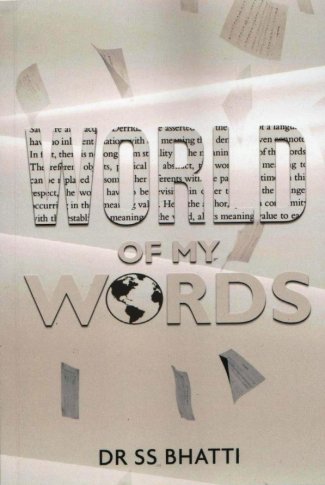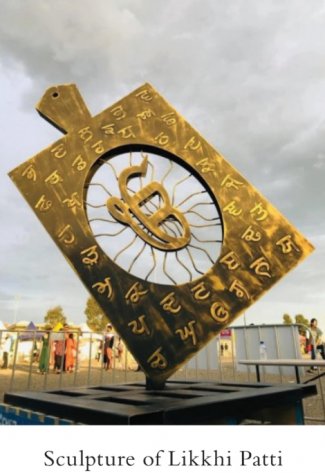Image of Gurdwara Patti Likhi, Nankana Sahib, present day Pakistan
Title of Book: World of My Words
Authored by: Dr. Surindera Singh Bhatti, Chandigarh
Published by: White Falcon Publishing, Chandigarh, 2021 (Paperback First Edition, Pages: 174; Price: Rs.400)
Reviewed by: Prof. Hardev Singh Virk, #14017, 30 Ave, Surrey, BC, Canada
Dr Surendra Singh Bhatti is a multi-dimensional personality and a celebrated author with three doctorates in his kitty on three different subjects of his intensive life-long study. I had the privilege to review his four books for The Sikh Review and the Sikh Net, starting with "JAPUJI: Exegesis and Poetic Rendering" and continuing with "Notes to Myself", “Guru Nanak Dev ─ Dispenser of Love and Light” and “Creative Mysticism: Guru Nanak's Pragmatic Spirituality”. The present volume under review “World of My Words” is another unique contribution of the celebrated author. I was trying to wriggle out of my commitment to write its review thinking myself incompetent to probe the inscrutable world of Dr. Bhatti. In every creation of his literary genius, he appears to me as a new avatar.
In the preface to “Guru Nanak Dev ─ Dispenser of Love and Light”, Dr. Bhatti writes: "I dare say mine is not a routine write-up of the kind that professional scholars tend to produce. It is backed up by a treasure trove of versatile artistry rooted in Creative Mysticism as my family’s invaluable legacy across a few centuries". I endorse his statement after reading this volume where he creates a tapestry of word formations using his expertise of architectural design. Dr. Sharda Kaushik, in her Foreword, pays glowing tributes to the author: “He displays an amazing gift for playing with the language, interestingly creating and coining words in novel styles, under titles like psychology, engineering, philosophy, and a few others. Dr Bhatti lives by the philosophy he professes, expressing it in a variety of art-forms, be it landscaping, drawing and design, painting, poetry, lexicography, or rhetoric”.
The contents of this volume are composed of four books: “Stray Musings; Dictionary of de-ACRONYM-isation; New Coinages; and, POEMS based on de-ACRONYM-isation”. To a cursory look, the contents look like a mélange of Prose, Poetry and Coinage of Word pictures created by the author to satisfy his musings. Introduction to the original volume published in 2013 explains the purpose of writing this anthology: “These Stray Musings I have been regularly noting down in my diaries over 50 years of recurrent rumination. Whatever used to catch my fancy would invariably yield a strong stimulus for a contemplative response which would in due course of time produce several hundred “Stray Musings”. In the same vein, insight coupled with mulling turned out from my mind’s workshop innumerable Words in their de-ACRONYM-ised form contained in Book Two”. This anthology is a half-a-century-long labour of love by the author in the unique art of words-smithy.
In the Preface, the author reveals the secret about this volume which was published in USA (available on Amazon) in 2013 under the title “WORDS”. Dr. Bhatti writes: “I have changed the original title “WORDS” from my previous book published in America to “WORLD OF MY WORDS” for the simple reason that this book is a mini-dictionary of about five hundred words to which I have imparted new connotations by using the method of de-ACRONYM-isation that I had invented”. The author is infatuated with these Words and conjures up highly emotive feelings for them: “They are my psycho-emotional flying crafts which take me on frequent astral travels into the past and the future without any hassles of passports and visas—and let me sit now with Socrates, Eliot, Iqbal, or Shakespeare who belong to the Past; then, in the next moment, with the World’s Greats to be born in the Future”. The author imparts to the “WORD” a sacrosanct meaning: “It is a World in which dwell the Ordinary, the Rational, and the Divine”. Dr. Bhatti sums up the Preface by recounting 13 mechanisms for creation of new words.
The contents of the opening Chapter of Book One: “Ponderings that Make up My Credo” can prove to be eye-catching and mesmerizing for any reader who dares to ponder over it. It has many quotes worth its weight of gold: “Nature is God’s manifest might”. “Five senses (visual, audial, olfactory, gustatory, and tactile), which provide the necessary material to Mind, have been given to Man to enjoy Beauty”. “Man is a pain-avoiding, pleasure-seeking, myth-making animal who wanders life after life in the illimitable Desert of Existence”. “Beauty supplies the raw material for aesthetic experience without which the contemplation on the nature of Reality cannot come about”. “The four faculties of Reason, Emotion, Imagination, and Intuition are Man’s chief gifts bestowed on him by God”.
I consider the Second Chapter of Book One “Mind’s Fascinating Faculties” as the original contribution of the author to the world of literature. He writes: “Mind is the Software of the Brain, which is the Hardware of the Human Computer. It has Fascinating Faculties, the familiar and not-so-familiar. The familiar ones are: Reason, Emotion, Imagination, Intuition, and Memory. The not-so-familiar ones are: Psychonom, and Psychonaut: my coinages for the Creative and Spiritual Faculties, respectively”. He goes on to explain Shabda and Surat connection in his unique way: “When the tongue utters the Shabda, the Mind must listen with undivided attention, Surat, or Soul-Consciousness. When the two strike perfect concordance the Mind gets implanted in the Holy Word—and the Soul sees its ancestry in G-O-D: Generator, Operator, Destroyer”.
“Deft Definitions and Short Essays” is the longest Chapter of this book where the author creates vast paraphernalia of definitions as the leitmotif of this volume. He has created a sort of dictionary of definitions. I selected just two out of hundreds to show the stamp of the author's genius. He defines Religion and Indian Democracy sarcastically: “All RELIGIONS of the world are fundamentally the same but their different modes of Worship turn them into different types of War-Ship constantly engaged in killing each other’s followers with qualmless zeal and perverse creedal justification”. “DEMOCRACY, in India, has succeeded in creating a vast variety of General Inconveniences in place of Public Conveniences; the result is that wherever there are buildings there are serpentine queues for obtaining rationed items of daily consumption. And the remaining unbuilt territory of the entire country is one enormous Lavatory within the easy reach of the teeming millions to ease themselves in full view of others under the protecting canopy of the open sky”.
Book two is titled “Dictionary of de-ACRONYM-isation”. The author starts his journey with the definition of Acronym: “An acronym is a word formed from the initial letters or groups of letters of the words in a name or phrase. UNESCO [United Nations Educational, Scientific, and Cultural Organization] and LASER [Lightwave Amplification by Stimulated Emission of Radiation] are acronyms”. He goes on to define ‘de-ACRONYM-isation’ thus means the process that regards each word as an acronym which could be traced to the many words whose initial letters were used in its formation.
For sake of illustration, I took fancy to ‘de-ACRONYM-isation’ of Science and Scientist from the author’s vast reservoir of acronyms:
SCIENCE = Sensibility with Child’s Inquisitiveness, Enthusiasm, and Native Concept-forming Expertise.
SCIENTIST = Searching Constantly for Inner evidence (i.e., principles) of the External world and its Natural working independent of Theological dogmas/doctrines or any individual’s Insinuations for the sake of Self-evident Truth.
The author claims “New Coinages” of Book Three as his new invention. I select “MYSDOM” as a sample for sake of illustration:
Definition: Wisdom acquired through mysticism.
Mysdom is a higher, deeper, and wider form of wisdom (which is intelligence mellowed by experience.)
Additional Information: “Mystical + Wisdom”
Example Sentence: Persons possessed of mysdom, truly follow the dictum “eat to live, not live to eat”, as a spontaneous gesture of simple living and high thinking, not for showing off or for impressing others.
In the Chapter “Forms of Intelligence”, author claims to have discovered that Intelligence performs nine new functions which deserve to be recognized as independent mental abilities and separately defined for use in the English language for pertness and precision of expression.
There are 16 Sonnets in Book Four “POEMS based on de-ACRONYM-isation”. I consider this book as the masterpiece of the author as he claims to have written more Sonnets in English as compared to William Shakespeare, the poet-laureate of English literature. All these Sonnets reflect the art and craft of Dr. Bhatti as a poet.
To end my review, I add one of the Sonnets for sake of illustration. I hope the readers will enjoy reading this book by Dr SS Bhatti as a ‘fount of knowledge’.
ETHICS, AESTHETICS, LOGIC, AND METAPHYSICS
Ethics, Aesthetics, Logic, and Metaphysics
Are branches of the same field: Philosophy
To these may be added the fifth one: Politics
Together they reflect on the values of Humanity
Ethics is the Science of Morality; Aesthetics, of Beauty
Metaphysics thinks things to their ultimate significance
Politics orders relations between State and the Society
Logic deals with correct reasoning, in common parlance
The making of Culture and its practice are secular
To profess and propagate one’s Faith is religious
Understanding these reveals something spectacular
What we humans make lands us in unseemly mess
All Knowledge is worthless if we practise it by rote
And remain uncivilised, cutting each other’s throat
*****








